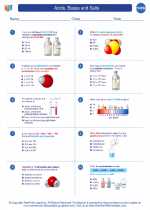Hardness in Chemistry
Hardness in chemistry refers to the resistance of a substance to being scratched or dented. It is an important property of materials and is often used to determine the suitability of a material for a specific purpose, such as in construction, engineering, or manufacturing.
Types of Hardness
There are several types of hardness that are commonly discussed in chemistry:
- Mohs Hardness: This scale measures the scratch resistance of minerals. It is a qualitative scale ranging from 1 (very soft) to 10 (very hard).
- Brinell Hardness: This measures the indentation hardness of materials. It involves applying a specified load to the surface of the material and measuring the diameter of the indentation left by the indenter.
- Rockwell Hardness: This is another measure of indentation hardness, but it uses different scales and indenters than the Brinell test.
Factors Affecting Hardness
Several factors can affect the hardness of a material, including:
- Composition: The chemical composition of a material can greatly influence its hardness. For example, carbon content can affect the hardness of steel.
- Crystal Structure: The arrangement of atoms in a material's crystal lattice can also impact its hardness.
- Temperature: In some materials, hardness may change with temperature due to changes in the crystal structure or other factors.
Applications of Hardness
Hardness testing is used in various industries and fields, including:
- Manufacturing: To ensure the quality and durability of materials used in the production of goods.
- Construction: To determine the suitability of materials for building structures and infrastructure.
- Engineering: To select materials for specific applications based on their hardness and other properties.
Study Guide
When studying hardness in chemistry, it's important to focus on the following key points:
- Understand the different types of hardness tests and how they are conducted.
- Learn about the factors that influence the hardness of materials, such as composition, crystal structure, and temperature.
- Explore the applications of hardness testing in various industries and fields.
- Practice identifying and comparing the hardness of different materials using the Mohs scale or other quantitative measures.
By mastering these concepts, you will be well-prepared to understand and apply the principles of hardness in chemistry.
[Hardness] Related Worksheets and Study Guides:
.◂Chemistry Worksheets and Study Guides High School. Acids, Bases and Salts
Worksheet/Answer key Acids, Bases and Salts
Acids, Bases and Salts  Worksheet/Answer key
Worksheet/Answer key Acids, Bases and Salts
Acids, Bases and Salts  Worksheet/Answer key
Worksheet/Answer key Acids, Bases and Salts
Acids, Bases and Salts  Vocabulary/Answer key
Vocabulary/Answer key Acids, bases and salts
Acids, bases and salts 

 Worksheet/Answer key
Worksheet/Answer key
 Worksheet/Answer key
Worksheet/Answer key
 Vocabulary/Answer key
Vocabulary/Answer key

The resources above cover the following skills:
CHEMISTRY
Matter and Its Interactions
Use mathematics and computational thinking to express the concentrations of solutions quantitatively using molarity.
Use the concept of pH as a model to predict the relative properties of strong, weak, concentrated, and dilute acids and bases (e.g., Arrhenius and Brønsted-Lowry acids and bases).